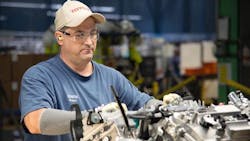Toyota to Invest $400 Million in West Virginia Plant Upgrade
The Toyota plant in Buffalo, W.V., which opened in 1997, just got a nice 20th anniversary present: a $400 million investment over the next four years.
During a ceremony marking the anniversary that was attended by state dignitaries, retired Toyota Chairman Shoichiro Toyoda announced the investment.
“Twenty years ago we fell in love with not only the beautiful countryside of West Virginia, but the people,” he said. “We are very proud of the incredible accomplishments this plant and the team members have made. The future is bright.”
When the Buffalo, W.V., plant first opened in 1997, 19,000 people applied for 300 job openings. The plant cost $400 million then, with the capacity to produce 300,000 four-cylinder engines annually.
The plant, which has expanded eight times, now has about 1,600 employees. The $400 million investment to further modernize operations includes a conversion of the current generation six-speed transmission lines to next-generation eight-speed transmission lines.
The only Toyota plant in North America that makes both engines and transmissions, Toyota Motor Manufacturing West Virginia produces more than 650,000 engines and 740,000 transmissions annually. The $1.4 billion facility currently makes four- and six-cylinder engines for the Toyota Corolla, Sienna, Highlander and Lexus RX 350, as well as transmissions for the Toyota Camry, Avalon, Sienna, Highlander and RAV4 and Lexus RX 350 models built in North America.
A new transmission rolls off the assembly line about every 25 seconds, with four-cylinder engines rolling off every 30 seconds. Those speeds are the fastest production times for Toyota, globally.
A recent study by the Center for Automotive Research found that for every one Toyota job in West Virginia, there are nearly two other jobs created across the state.
During the recession of 2008-2009, the plant did not have any layoffs although it was shut down for three months. During that time, team members trained, did community service or volunteered for other organizations and still received their paychecks.
“They really showed me what job security meant. People can plan. They can plan to send their kids to school. They don’t have to worry about losing their jobs,” Larry “Odie” O’Dell, a facilities group leader, said in a press release from Toyota. “When I got the job, I felt like I hit the lottery. Now, almost 20 years later, I can say I did hit the lottery. This is my home now.”
About the Author
IW Staff
Find contact information for the IndustryWeek staff: Contact IndustryWeek
